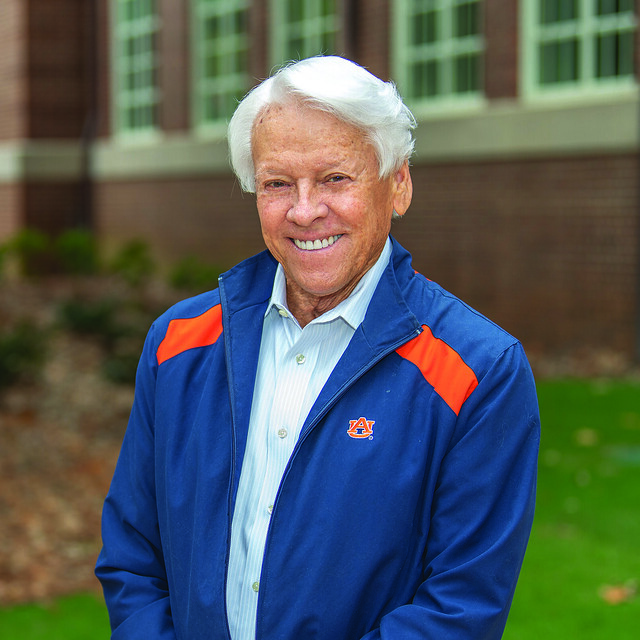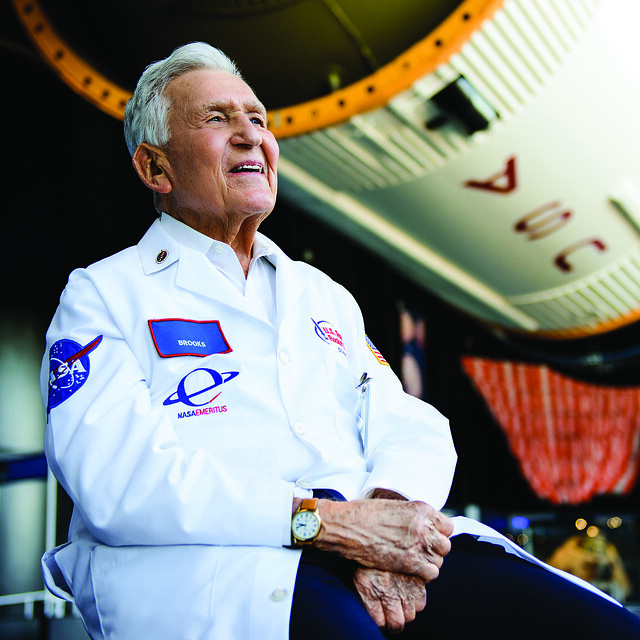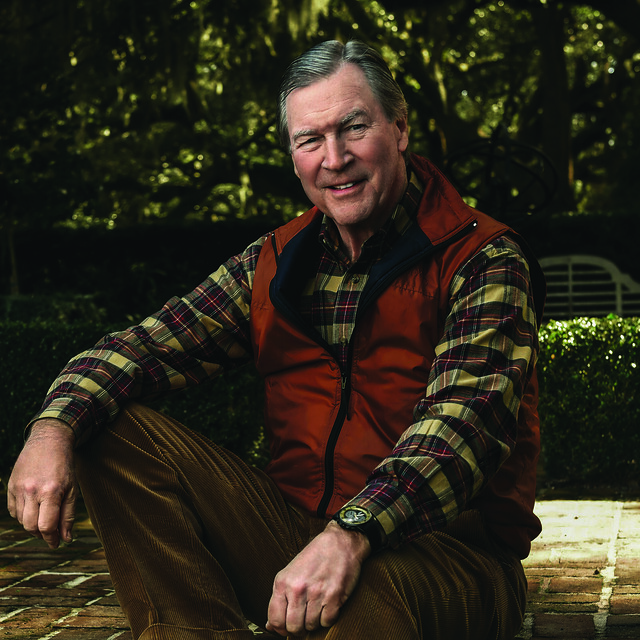Auburn Alumni Association to honor 2021 Lifetime Achievement Award and Young Alumni Achievement Award recipients
Article body
Five Auburn University graduates, all highly accomplished in their fields, have been selected to receive the highest honor given by the Auburn Alumni Association at Auburn’s 2021 Lifetime Achievement Awards ceremony June 12.
Lifetime Achievement Award recipients for 2021 are Cecil Stanford “Stan” Harrell ’58, the late Raymond Elliott Loyd ’61, Fletcher Brooks Moore ’48 and William Allen Reed ’70. The Young Alumni Award recipient is Dr. John Dykes ’05. Recipients will be honored at a dinner and ceremony in June.
-
Harrell grew up in Thomaston, Alabama, and graduated from Auburn in 1958 with a degree in pharmaceutical science. He founded Medical Arts Pharmacy, or MAP, in 1965 to provide wholesale pharmaceuticals, light medical equipment and supplies to individuals as well as companies. One of the first mail-order drug businesses in the United States, MAP became Pharmacy Management Services, Inc. in 1972, focusing on health care cost containment for workers’ compensation clients. Harrell served as the firm’s president, chairman and CEO until it was sold to Beverly Enterprises in 1995. Harrell served 18 months in the U.S. Army Medical Corps in Europe. He has served as director of National Healthcare Resources, Inc., American Managed Care Pharmacy Association, Nationsbank South, Pharmerica, AmSouth Bank, Whitney Bank and Hancock Bank of Florida. He has also served on numerous charitable boards, including the Metropolitan Ministries of Tampa, the Tampa General Hospital Foundation and the Tampa Bay History Center. In 2012, Harrell published Canebrake Planters, a book presenting the genealogy of historical homes, churches and plantations in the Canebrake region of Alabama. Harrell and his late wife, Frankie, have two children, Whitney and Christopher. He is a life member of the Auburn Alumni Association.
-
Loyd, after earning his degree in mechanical engineering in 1961, was accepted to General Electric’s engineering training program where he became a design engineer in General Electric’s appliance division. Loyd changed the way Americans live through his work in air-conditioning technology and his development of the Carry Cool, the first room air conditioner under $100 to sell profitably. In 1977, Loyd founded Derby Packaging, a startup fabricator of insulation and gaskets. Later, as Derby Industries, the company specialized in global supply chains and inventory management, assemblies and contract manufacturing, spare parts and warranty repairs, retail packaging and distribution and information systems. In 2000, Loyd sold part of the business, but retained the die-cutting portion, which, as Derby Fabricating, has become a leading die-cutter of nonmetallic materials for automotive and appliance clients. He received the Samuel Ginn College of Engineering’s Distinguished Auburn Engineer award in 2008 and was inducted into the State of Alabama Engineering Hall of Fame in 2012. Loyd established the Raymond E. and Eleanor H. Loyd Annual Dean’s Scholarship in the Samuel Ginn College of Engineering and was a life member of the Auburn Alumni Association. Loyd died in November 2020 and was preceded in death by his wife, Eleanor, and both of his children. His award will be presented to his grandchildren.
-
Moore graduated in 1948 with a degree in electrical engineering. He spent more than 50 years working in the space industry, beginning at the Naval Research Laboratory in Panama City, Florida, and later with the U.S. Army’s Rocket Development Team under Wernher von Braun. In Huntsville, he directed the design of control systems for the Redstone, Jupiter and Pershing missile systems, a development effort that led to the 1958 launch of the first U.S. satellite, Explorer. A charter member of NASA when the agency formed in 1960, Moore oversaw the design of guidance, control, electrical and computer systems for the Saturn I, IB and V rockets. He later worked on the development of technology for Skylab, the first U.S. space station, and later the Hubble Telescope and served as president of Control Dynamics until his retirement. For his work with NASA, the Army Missile Command and private industry, Brooks received many special honors, including induction in the Distinguished Auburn Engineer award from the Samuel Ginn College of Engineering in 2020 and induction into the Georgia Tech Hall of Fame and the State of Alabama Engineering Hall of Fame in 1997. Brooks and his late wife, Marian, have two sons, Larry ’80 and Ronald ’81. He is a life member of the Auburn Alumni Association.
-
Reed earned his degree in aviation management in 1970. He served as president of the Hughes Investment Company, a wholly owned subsidiary managing the company’s pension and savings-plan assets, before being promoted to vice president of Hughes Aircraft Co. in 1991 and then to the same position with GM Hughes Electronics the following year. In 1994, he was named CEO of General Motors, as well as chairman and CEO of the GM Trust Bank and as a corporate vice president of General Motors Corporation. Reed retired in April 2006 from the chairmanship of the GM Asset Management Company, the investment management subsidiary of General Motors, responsible for managing $165 billion in benefit fund assets for GM and others. He and his wife, Martha ’69, have established scholarships at Auburn in the colleges of Engineering, Business and Human Sciences. Reed created and manages the Angel Oak Summer Reading Program at Angel Oak Elementary School on Johns Island, South Carolina, and in 2018 was awarded the Angel Oak Award by the Kiawah-Seabrook Exchange Club Foundation. The Reeds have two sons, Brian and Justin. He is a life member of the Auburn Alumni Association.
-
Dykes earned his degree in microbiology in 2005 and completed his medical degree at the Medical College of Georgia. A pediatric cardiologist specializing in pediatric heart failure and transplantation at Stanford University, John Dykes treats critically ill young patients, does groundbreaking research and participates in the education of medical trainees as a clinical assistant professor in pediatrics. He has a long history of working to improve the health of those in need. While still a student at Auburn, Dykes provided primary care to medically underserved residents of Lee County as a volunteer with Mercy Medical Clinic. His research interests include improving outcomes for children with advanced heart failure, including those who require ventricular assist devices and heart transplantation. Dykes and his wife, Nicole, have a son, James, born in February. Dykes is a life member of the Auburn Alumni Association.
Related Media
Media interested in this story can contact Communications Director Preston Sparks at (334) 844-9999 or preston.sparks@auburn.edu.
Auburn University is a nationally ranked land grant institution recognized for its commitment to world-class scholarship, interdisciplinary research with an elite, top-tier Carnegie R1 classification, life-changing outreach with Carnegie’s Community Engagement designation and an undergraduate education experience second to none. Auburn is home to more than 30,000 students, and its faculty and research partners collaborate to develop and deliver meaningful scholarship, science and technology-based advancements that meet pressing regional, national and global needs. Auburn’s commitment to active student engagement, professional success and public/private partnership drives a growing reputation for outreach and extension that delivers broad economic, health and societal impact.









